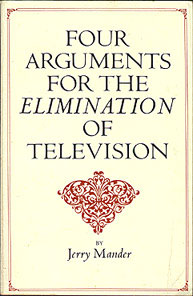
Four Arguments for the Elimination of Television
Mander, Jerry
A Good Book for Avid Readers...
If you are reading books at a rate higher than one per year, then you are above the US national averages as of 2002, I am sure they have fallen since then. And how many of those people are only reading a dog-eared copy of T.V. Guide (maybe the same one, over and over?).
That statistic came from a survey of information I was forced to compile during graduate studies on the potential effects of amazon.com and companies like Bertlemann AG who succeed only to monopolize the sales channels of information that we read in books through economies of scale production and standardization of product which requires irresolute narrowing down of the variabilities of subject, content, and message.
Thus fewer and fewer opportunities for authors to publish, especially works which might incite fewer than a requiste number of customers for a large scale enterprise. That there are fewer and fewer print media available for scale publications helps explain the growth of web logs, and user-defined comments and information such as this review.
But what reader would really prefer to be wedded to a computer screen than a well printed and bound book?
As my sister said, "You can't curl up with a computer". But for many, books are already out of style, and out of print.
So too, TV is continously narrowing global perspectives which obviously leads back to the route causes of forced concensus: television and its effects upon the information content and utility of data to be transmitted and consumed to the masses; not for the sake of education or enlightenment but to implicate the subconscious human complexes and modes of desire which will effectively promote a mass-consumption society to maintain a driven capitalism which only increasingly appears to successfully separate individuals from the ability to analyze their own minds and reflect on better usages for their disposable incomes than mass marketing and advertising would permit.
So Jerry Mander helps explain why a book like his is hard to find, too few are critical of the media which are inseparably sewn into the fabrics of our globalized and increasingly standardized consumer cultures worldwide.
I took to reading books in the last few months specifically because cable rates which I felt were fair were unavailable.
I also felt it was a waste to purchase another DVD or video player, I have one stuck in a box on the other side of the world.
Mander may have relied on scant data, but he helps a reader appreciate the benefits of reading, particularly in the ability to process large amounts of information as a controlable and variable input for each individual. Also the scale and depth of information which can be gained over considerable time through extensive reading practice; his discussion of these topics is still quite relevant.
However, TV is losing market share to internet and thus there must be some connection to verifiable and reputable data loss inherent in the leap from narrow-focused market driven information such as TV delivers and the as yet fully-developed internet technology which could overwhelm in the area of special-interest defined information without relevant research for recommendations and conclusions on various topics.
Mander realigned my perspectives on television and its effects and caused me to think of internet as a form of extension of it. But I would not eliminate either of them.
For the differences in the quality of information available for processing is more highly user-defined over time. As in, as we age, we must take greater responsibility for the inputs we allow to enter our minds.
I am happy to have chosen this book as an online purchase anyway. Television sucks compared to about 80% of the books I have read. This book will encourage you to make more time for books in general.
As a result my T.V. is my second or third entertainment option. Mander says TV helps us unlearn how to think. I agree.

No comments:
Post a Comment